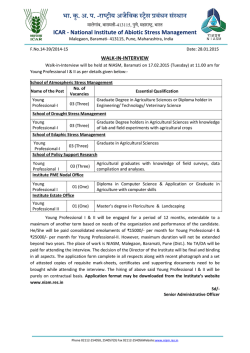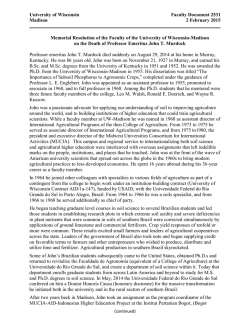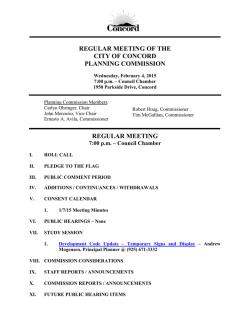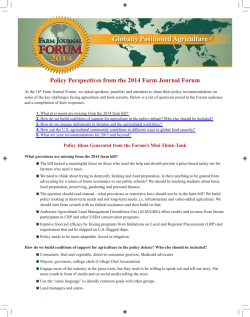
14CA0889 - Colorado State Judicial Branch
COLORADO COURT OF APPEALS 2015COA5 _______________________________________________________________________________ Court of Appeals No. 14CA0889 Industrial Claim Appeals Office of the State of Colorado DD No. 17075-2013 _______________________________________________________________________________ Whitewater Hill, LLC, Petitioner, v. Industrial Claim Appeals Office of the State of Colorado; and Division of Unemployment Insurance Employer Services – Integrity Employer Audits, Respondents. _______________________________________________________________________________ ORDER SET ASIDE AND CASE REMANDED WITH DIRECTIONS Division III Opinion by JUDGE NEY* Loeb, C.J., and Roy*, J., concur Announced January 29, 2015 _______________________________________________________________________________ John Behrs, as Authorized Representative of Whitewater Hill, LLC Cynthia H. Coffman, Attorney General, John August Lizza, First Assistant Attorney General, Sophia Lenz, Assistant Attorney General, Denver, Colorado, for Respondent Industrial Claim Appeals Office No Appearance for Respondent Division of Unemployment Insurance Employer Services – Integrity Employer Audits *Sitting by assignment of the Chief Justice under provisions of Colo. Const. art. VI, § 5(3), and § 24-51-1105, C.R.S. 2014. ¶1 This case raises the issue of whether certain agricultural work constituted “employment” under the Colorado Employment Security Act (CESA). The dispute centers around the interpretation of section 8-70-120(1)(a), C.R.S. 2014, a CESA provision that defines when agricultural labor is deemed statutory employment. ¶2 A hearing officer and the Industrial Claim Appeals Office (Panel) reached differing and conflicting interpretations of this statute which, in turn, resulted in conflicting conclusions as to whether the work was covered employment. ¶3 We conclude that the hearing officer’s interpretation of the statute was correct and that the work performed was not employment as defined under CESA. Consequently, we set aside the Panel’s order and remand with instructions to reinstate the hearing officer’s decision. I. Procedural Background ¶4 Petitioner, Whitewater Hill, LLC (Whitewater), operates a small vineyard and winery. Following an audit, the Colorado Department of Labor and Employment (Department) issued a liability determination concluding that agricultural work performed by 1 certain individuals (the workers) for Whitewater amounted to covered employment and that Whitewater must pay taxes on amounts it paid the workers. ¶5 Whitewater appealed the liability determination arguing, as pertinent here, that the services were “agricultural labor” and therefore fell outside CESA’s definition of employment. Following an administrative hearing, the hearing officer made findings concerning the number of workers Whitewater had employed. Based on those findings and her interpretation of section 8-70120(1)(a), the hearing officer concluded that the workers’ services were not employment, but rather exempt agricultural labor. Consequently, the hearing officer concluded that Whitewater was not required to pay taxes on the amounts it paid the workers.1 ¶6 On review, the Panel disagreed with the hearing officer’s interpretation of section 8-70-120(1)(a) and set forth its own differing interpretation of the statute. The Panel set aside the The hearing officer also determined that, as a threshold matter, the workers’ services constituted employment under the general provisions of section 8-70-115, C.R.S. 2014. We do not address this determination, however, because Whitewater did not challenge it at the administrative level and, instead, focused solely on the agricultural labor exemption issue. 1 2 hearing officer’s decision and remanded for additional factual findings. ¶7 On remand, the hearing officer made supplemental findings as instructed but adhered to her original interpretation of section 870-120(1)(a). Based on that interpretation, the hearing officer again concluded that the workers’ services constituted exempt agricultural labor. ¶8 Whitewater appealed a second time. On review, the Panel applied its previous interpretation of section 8-70-120(1)(a) to the hearing officer’s new findings and concluded that the workers’ services constituted covered employment. Whitewater now seeks judicial review of the Panel’s order. II. Analysis ¶9 Whitewater contends that the workers’ services were exempt agricultural labor under CESA and that the Panel misinterpreted section 8-70-120(1)(a). We agree. A. Standard of Review ¶ 10 We may set aside the Panel’s decision if it is erroneous as a matter of law. See § 8-74-107(6)(d), C.R.S. 2014. We are bound by 3 the hearing officer’s evidentiary findings of fact, which are not in dispute here, if they are supported by substantial evidence in the record. Harbert v. Indus. Claim Appeals Office, 2012 COA 23, ¶ 7. However, we review de novo an agency’s legal conclusions, including its interpretation of statutes. Commc’ns Workers of Am. 7717 v. Indus. Claim Appeals Office, 2012 COA 148, ¶ 7; see Indus. Claim Appeals Office v. Softrock Geological Servs., Inc., 2014 CO 30, ¶ 9 (“[W]hether the ICAO . . . applied the appropriate test is a question of law that we review de novo.”). B. Agricultural Labor/Covered Employment ¶ 11 Section 8-70-109, C.R.S. 2014, defines certain work activities that constitute “agricultural labor.” The parties do not dispute that the workers’ services in this case fall within this definition. ¶ 12 Section 8-70-126, C.R.S. 2014, provides that covered employment “does not include services performed by an individual in agricultural labor . . . except as provided in section 8-70-120.” See also § 8-70-113(1)(d), C.R.S. 2014 (providing that the term “employer” means “[a]ny employing unit for which agricultural labor as defined in section 8-70-109 is performed and is defined as 4 employment in section 8-70-120”). ¶ 13 Section 8-70-120, in turn, describes the limited circumstances in which agricultural labor may be treated as covered employment subject to taxation. In this appeal, the parties dispute the meaning of section 8-70-120(1)(a). That subsection provides, in pertinent part, as follows: (1) “Employment” means services performed . . . by an individual in agricultural labor . . . when: (a) Such service is performed for a person who . . . for some portion of a day in each of twenty different calendar weeks . . . in either the current or the preceding calendar year, employed in agricultural labor . . . ten or more individuals, regardless of whether they were employed at the same moment of time. C. The Meaning of Section 8-70-120(1)(a) ¶ 14 Whitewater and the hearing officer interpret section 8-70- 120(1)(a) to require that, during the current or preceding year, a putative employer employed ten or more agricultural workers within each of twenty different weeks. More simply stated by the hearing officer, the statute requires “[twenty] weeks with ten [or more] agricultural workers each.” Because Whitewater had employed ten 5 or more agricultural workers in only four different weeks from 2011 through the first quarter of 2013, the hearing officer concluded that the workers’ services were not “employment” under section 8-70120(1)(a). ¶ 15 In contrast, the Panel interprets section 8-70-120(1)(a) to require merely that a putative employer hired ten or more agricultural workers within a year and employed at least one agricultural worker in twenty different weeks. Because Whitewater employed more than ten total agricultural workers during 2011 and 2012 and employed at least one such worker in more than twenty weeks during both years, the Panel concluded that the workers’ services constituted employment. ¶ 16 We agree with the hearing officer’s and Whitewater’s interpretation of the statute. ¶ 17 Our primary task in construing a statute is to give effect to the General Assembly’s intent. Yotes, Inc. v. Indus. Claim Appeals Office, 2013 COA 124, ¶ 14. We first look to the plain and ordinary meaning of the words the General Assembly chose to utilize. Accord Human Res., Inc. v. Indus. Claim Appeals Office, 275 P.3d 697, 700 6 (Colo. App. 2010), aff’d, 2012 CO 15. We give consistent, harmonious, and sensible effect to all parts of the statute, and we seek to avoid an interpretation that would render any statutory language meaningless. Yotes, ¶ 14. We also must “not ascribe a meaning that would lead to an illogical or absurd result.” Id. ¶ 18 In our view, the Panel’s interpretation of section 8-70-120(1)(a) ignores the statute’s express requirement that a putative employer have employed ten or more workers in each of twenty different calendar weeks. The word “each” is a ‘“distributive adjective pronoun, which denotes or refers to every one of the persons or things mentioned.’” Hayes v. Ottke, 2013 CO 1, ¶ 20 (quoting Black’s Law Dictionary 507 (6th ed. 1991)); see Mut. Sav. & Bldg. Ass’n v. Canon Block Inv. Co., 67 Colo. 75, 79, 185 P. 649, 650 (1919) (concluding that the expression “each year” meant “every one of two or more years”). ¶ 19 The Panel argues that interpreting the statute to require the hiring of ten or more workers in each of twenty different weeks renders meaningless the phrase “regardless of whether they were employed at the same moment of time.” We disagree. That phrase 7 simply means that all individuals who worked on a given day must be counted toward the total, regardless of whether they worked at the same time during that day. This interpretation allows us to give effect to both this phrase and to the “in each” language appearing earlier in the same sentence. ¶ 20 Our interpretation of section 8-70-120(1)(a) also comports with the General Assembly’s intent that CESA provisions be construed to conform with federal authorities. See § 8-70-108, C.R.S. 2014 (providing that if any provisions of CESA “are determined to be in nonconformity with federal statutes,” the Division of Unemployment Insurance “is authorized to administer said articles so as to conform with the provisions of the federal statutes”); see also Indus. Comm’n v. Bd. of Cnty. Comm’rs, 690 P.2d 839, 845 (Colo. 1984). ¶ 21 Section 8-70-120(1)(a) is based on 26 U.S.C. § 3306(a)(2)(B) (2012). As pertinent here, that statute provides that concerning agricultural labor, the term “employer” means any person who on each of some 20 days during the calendar year or during the preceding calendar year, each day being in a different calendar week, employed at least 10 individuals in employment in agricultural labor for some portion of the day. ¶ 22 This federal provision plainly requires that, to be deemed an 8 employer, the putative employer must have hired at least ten agricultural workers in each of twenty different weeks. Our interpretation of section 8-70-120(1)(a) is consistent with this federal counterpart. See Bd. of Cnty. Comm’rs, 690 P.2d at 845. ¶ 23 The disputed language in section 8-70-120(1)(a) first appeared in 1977 as one of numerous definitional amendments to CESA. See Ch. 91, sec. 4, § 8-70-103(10)(f.3)(I)(A), 1977 Colo. Sess. Laws 1615. As Whitewater notes, the legislative history of these 1977 amendments shows they were intended to make CESA conform to recent changes in federal law. See Hearing on H.B. 77-1614 before the S. Bus. Comm., 51st Gen. Assemb., 1st Sess. (Apr. 20, 1997); Hearing on H.B. 77-1614 before the H. Bus. Comm., 51st Gen. Assemb., 1st Sess. (Mar. 29, 1997); see also People v. Rockwell, 125 P.3d 410, 418-19 (Colo. 2005) (discussing statute’s legislative history to show that it did not contradict court’s interpretation based on clear and unambiguous language). ¶ 24 The Panel asserts that section 8-70-120(1)(a) reflects the General Assembly’s intent to create a broader definition of employment than that contained in 26 U.S.C. § 3306(a)(2)(B). 9 However, the Panel cites nothing from the legislative history of section 8-70-120(1)(a) or its predecessor, former section 8-70103(10)(f.3)(I)(A), to support this assertion. Instead, the Panel relies solely on its expansive reading of section 8-70-120(1)(a) which, as we have already concluded, is erroneous because it renders the language “in each” meaningless. ¶ 25 Finally, the Panel’s reliance on Laub v. Industrial Claim Appeals Office, 983 P.2d 815, 817 (Colo. App. 1999), is misplaced. In Laub, a division of this court addressed whether work performed for a nonprofit organization constituted “employment” under section 870-118, C.R.S. 2014. Although that statute contains language similar to section 8-70-120(1)(a) describing the number of workers a putative employer must hire over a specified time period, in Laub it was “undisputed” that these “timing provisions” of the statute had been “satisfied.” Laub, 983 P.2d at 816-17. Thus, Laub is not instructive because the division did not interpret section 8-70-118’s similar timing language. III. Conclusion ¶ 26 In sum, we conclude that because Whitewater employed ten or 10 more agricultural workers during each of only four different weeks in the audit period, the workers’ services did not constitute covered employment as defined in section 8-70-120(1)(a). Consequently, Whitewater was not required to pay unemployment taxes on amounts it paid the workers. ¶ 27 The Panel’s order is set aside insofar as it concluded that the workers’ services constituted covered employment rather than exempt agricultural labor, and the case is remanded with directions to reinstate the hearing officer’s decision. CHIEF JUDGE LOEB and JUDGE ROY concur. 11
© Copyright 2026




